There was a time when cars got great gas mileage – better than 40 MPG. That was before they got “safe,” as defined by the government. Bracketed in air-fingers quote marks to ridicule the assertion.
Compliant is the more accurate way to put it. As in the car is compliant with whatever the latest “safety” regulations stipulate.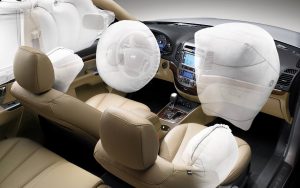
Is a car less likely to crash if it has six air bags? It may be more likely to crash – due to the decreased outward visibility caused by the bulbous interior structure (i.e., a massive breadbox dashboard, tall door panels, etc.) added to house all those government-mandated air bags. The structure makes it harder to see what’s going on outside the car. Thus making it more likely the driver won’t see it.
Which is why the government – the regulatory apparat that no one elected and which for that reason cannot be un-elected and so operates as a dictatorial branch of the federal government – decreed that, for “safety,” all vehicles must be equipped with remote-view camera systems, so that people can see what the government’s regulations have made it harder to see. Similarly, all vehicles now have Blind Spot Warning systems – because government-mandated “safe” vehicles have terrible blind spots.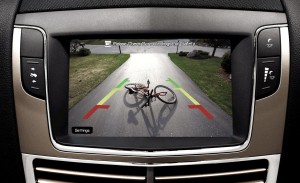
All of this “safety” has also made government-mandated vehicles heavier than vehicles have ever been. Just as you used to hear people say, “it’s a free country,” you almost never hear anyone talk about how overweight cars used to be.
There used to be a lot of talk like that. Because it was true. Italics to emphasize the past tense. And – once again – also because of the government.
In the early ’70s, the regulatory apparat began adding weight to cars by ordering that cars be built with bumpers that could absorb impacts of 5 MPH without incurring damage. This did not make the cars “safer,” in that having the bumpers affixed did not make the cars less likely to crash.
But it did make them several hundred pounds heavier.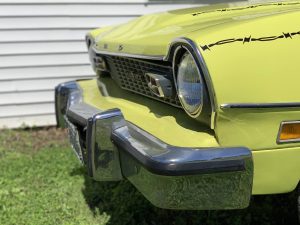
Around the same time, the apparat began decreeing how much gas new cars would be allowed to use. Italicized to make note of the fact that, at first, the apparat’s decrees applied chiefly to passenger cars. This created a pair of at-odds decrees. Cars had to be both “safe” and fuel-efficient. The solution that car industry came up with was to make cars smaller, so as to make them lighter – which made them more fuel-efficient.
By the early-mid 1980s, the typical American car was no longer a full-size car with a V8 engine, as had been the case before the apparat began decreeing that all cars must be fuel-efficient . (Never mind that fuel efficient cars were available before the unelected apparat got into the decreeing business; the apparat used the “fuel efficient” excuse to expand its power to mandate and regulate, which was always the point of the exercise and still is.)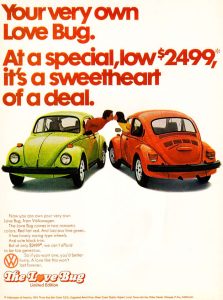
It had become a much smaller car, typically front-wheel-drive and powered by a four cylinder engine. And some of them – such as the Chrysler K-cars of that era – were remarkably fuel-efficient, achieving better than 40 MPG on the highway. But these smaller, lighter cars were not as “safe” as the heavier, less-fuel-efficient cars that preceded them.
Not more likely to crash. But not compliant with the latest round of “safety” decrees emanating from the apparat. So cars began to get heavier again – though almost all of them remained small, in terms of their dimensions. The weight added came in the form of structure under the skin – the latter getting thinner and lighter as a way to compensate (somewhat) for all the weight being added under the skin to make the car “safer.”
That is, more compliant.
Exterior panels have gotten so thin they can literally be bent by hand, which has made these cars a lot more expensive to repair when they are hit by anything. It is one of the costs of compliance.
But they are very “safe.”
And they are very heavy. Heavier than ever, in fact. A 2024 model year compact-sized crossover (in italics, to note the disappearance of cars, caused to a great extent by the apparat’s regs, which made cars too small to be practical, which is why the crossover is now the “car” bought by most people) such as a Chevy Trax weighs 3,062 lbs. That is about twice the weight of a compact-sized car from the early ’70s, such as the VW Beetle.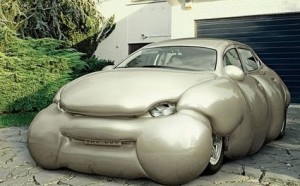
But the Beetle and cars like it were not “safe” – so we are assured. And thus we have crossovers such as the Trax that are very compliant – and not very fuel-efficient because they are so god-damned heavy.
The ’24 Trax – and this is not to single out the Trax but rather to point out an example – only manages 32 on the highway, not even close to what an ’80s-era Chrysler K-car delivered – notwithstanding that the Trax has a three cylinder engine. This engine is very efficient – relative to the carbureted four cylinder engine used in the K-car. But it has to pull so much more weight that its efficiency is negated.
Of course, the Trax is very “safe” relative to those old K-Cars.
You can thank the apparat for that.
. . .
If you like what you’ve found here please consider supporting EPautos.
We depend on you to keep the wheels turning!
Our donate button is here.
If you prefer not to use PayPal, our mailing address is:
EPautos
721 Hummingbird Lane SE
Copper Hill, VA 24079
PS: Get an EPautos magnet or sticker or coaster in return for a $20 or more one-time donation or a $10 or more monthly recurring donation. (Please be sure to tell us you want a magnet or sticker or coaster – and also, provide an address, so we know where to mail the thing!)
If you like items like the Baaaaaa! baseball cap pictured below, you can find that and more at the EPautos store!



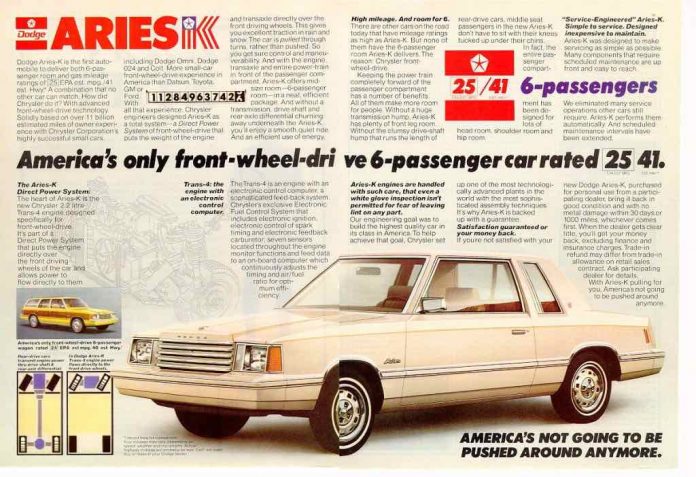








Instead of focusing on safety and fuel economy…. cars would be more fun if they were designed for performance…..light weight and maximum power….the old muscle cars were like that….
Safety…race cars are safe because they have a full rollcage….they are designed to protect the driver in high speed crashes….
Here is a car designed purely for performance….a Mk 2 VW Golf…it weighs 2100 lb and has 840 HP……in this hillclimb race it is the quickest car……
in video @ 17:26 – VW Golf Mk2 Rallye TFSi-R
https://www.youtube.com/watch?v=UAghPtHLJSI
If engineers are given a freehand to design for performance…the cars are far more exciting….
This is a brand new car….it is not in the media yet…..BMW i8 XR…..hillclimb race car
It weighs 2200 lb and has 4 engines…one at each wheel..each engine is a 4 cylinder one liter na engine that revs to 14,800 RPM…for a total of 850 HP…16 cylinders….
in video @ 18:16 BMW i8 XR…..new hillclimb race car….
https://www.youtube.com/watch?v=UAghPtHLJSI
There is one street legal car built for performance only…..
Donkervoort F22…….. Dutch sports car that can pull 2.15 G’s in corners, no other street legal car can do that, the quickest car sold in Europe…..
No driver assists only Traction control, manual transmission, no power steering….fully analog you have to drive the car….the best track car and the ultimate experience car…
750 kg. 1654 lb…..lightness matters….
A Donkervoort…. a Super 7 clone, with an Audi 1.8 lt. 20 valve turbo engine in 2003, 2004 had the world record lap time for any street legal car on the Nurburgring, (quite a bit faster then the tesla plaid lap time).
Donkervoort F22
The purest driving experience, best handling, lightest…… the best sports car, supercar….. exclusive only 75 made.
curb weight 1654 lb…………500 HP….Audi 5 cylinder turbo
That gives it a weight to power ratio of just under 3.4 lb/hp, which is better than that of a Bugatti Chiron Super Sport and on par with that of a McLaren P1.
2.15 G cornering the best of any street legal car in the world
Donkervoort GTO eats Porsche 911 GT3…….
https://www.youtube.com/watch?v=T_J0v69_r_4
Since when were people intrigued by fuel efficiency? Most people are still interested in owning “land yachts”.
Gil,
The point – which you’ve missed (again) – is that the government imposes fuel efficiency mandates as a general thing. But there have always been “efficient” cars available for those who want them. And would be, even absent government requirements. Because there is a market for that.
“But there have always been “efficient” cars available for those who want them.”
Both of them. But everyone else wants fuel guzzlers in spite of fuel being nowhere as cheap as it was decades ago.
Hi Gil,
You write: ” But everyone else wants fuel guzzlers in spite of fuel being nowhere as cheap as it was decades ago.”
And? So?
Maybe Elon Musk was right all along: most people want an expensive, large, fast truck to show off and that lacks safety features so it can’t be sold in many countries.
Gil,
What people want is precisely the point – in that Musk and the government aren’t allowing them to have it. Musk’s EVs are a result not of market demand by government demands.
‘cars began to get heavier again’ — eric
You’d think they were sneaking into the fridge in the garage by moonlight. ‘The serious eating starts after midnight,’ as the 900-pound man quipped.
One way to fight automotive obesity is to shun today’s corseted fatties, which are a lot heavier than they look. But how many vintage beauties are left?
A couple of professors have answered that question in an academic paper, complete with equations, Greek letters, integral signs ‘n shit. But the good stuff, which answers my original question, are the charts on pages 17 and 18:
https://tinyurl.com/2n82djpu
These charts show that at 30 years of age, only 10 percent of cars are still around (orange dots show latest data). This rises to 17 percent for SUVs and vans, and a healthy 38 percent for pickups.
It is too bad that Big Gov made it impossible to manufacture lightweight, simple cars. But plenty of vintage models that lack my two most hated features — Clownscreens and connected telematics — are still around.
They will have to peel my cold, dead hands off the steering wheel of my Nineties knockouts … which aren’t for sale!
“…the regulatory apparat that no one elected and which for that reason cannot be un-elected and so operates as a dictatorial branch of the federal government…”
“It is hard to imagine a more stupid or more dangerous way of making decisions than by putting those decisions in the hands of people who pay no price for being wrong.” Thomas Sowell
Is there anyway to remove the excess airbags without the car or uncle realizing it? I wanna trim weight after all.
In theory, you just need to solder in resistors along the wires of the same resistance as the airbag module when it says its working on standby. Computer shouldn’t be able to tell the difference. Unfortunately, getting little resistor packs has gotten harder without radio shack
Radio Shack is gone, but Digi Key has it all and can deliver REALLY fast
Saw this today and it made me wonder what is going to happen. https://www.lewrockwell.com/2024/06/jim-quinn/what-would-josey-wales-do/
“It may be more likely to crash – due to the decreased outward visibility caused by the bulbous interior structure (i.e., a massive breadbox dashboard, tall door panels, etc.)”
I drove a Wagoneer for a week out in the hills of TN and I was astonished at the almost Killdozer lack of visibility.
Yup. I drive a car from the 90s with skinny pillars and great visibility. I recently drove a new Lexus and was shocked of how enclosed it feels. I felt like I was driving by braille.
Also, people are almost always backing out in front of me while I drive through a parking lot. At first I was confused by the frequency of this, but then realized all drivers rely solely on a back-up camera. They can see only what’s directly behind them, but can’t see cars coming from the left and right. Of course a simple two-second twist of the head looking left and right before backing out would prevent this.
My old car does not have a back up camera, but my newer one does. Sorry to inform those saaaafety “experts” who think I need it, I never use it. Out of habit, I still look behind me, and use my side mirrors when backing up. What I really find hilarious, is when the back-up camera is covered in ice and snow during most of the Winter, and the nanny starts shilling at me. Knowing Big Brother is probably listening, I let them have it, and tell them, “Welcome to ** and our long Winters, get used to it”. And then I laugh my head off. It is up there with the stupid message (when I shut the vehicle off) reminding me to “Check Back Seat”. What? Because some dumb fool left his kid back there and the kid died? Borrowing a movie line, “what a stupid world”.
So a good news story –been helping young neighbor work on his 05 Chevy Avalanche. This is the same truck we yanked the transmission out of last year to replace the rear main seal.
Anyhow, he’d been getting a clunking sound when turning the steering wheel. So, he replaced the ball joints. No dice. We were talking about it yesterday & I stumbled on a video of a guy working a similar issue on a Hyundai Sonata. At the very end of the video he tightened the bolts on a crossmember, and voila, the sound went away.
So we did the same thing to the crossmember under the oil pan. And voila, it fixed the issue. Guess the bolts backed out after we put it back from the rear main seal thing.
Stuff like this always reminds me that determining the cause of a certain phenomenon oftentimes is very easy, but in some cases can be extremely difficult or nearly impossible.
I’d have hated to replace the steering column, steering box, pitman arms, etc only to find it didn’t work.
Its crazy- I have a 2014 Grand Cherokee that weighs almost as much as a 1986 K5 blazer, and the outside is not much smaller. The interior is the huge difference, the k5 can hold a huge amount of stuff while the GC has a midsize interior and foot thick doors. Good for holding women and delicate furniture though. Both tend to get damaged in the k5 which has no carpeting anywhere, and ultimately, the k5 holds more extra weight
These new over weight cars, huge SUV’s, 5000 lb EV’s, huge 6000 lb pickup trucks are not safe…
more pedestrians are being hit by EV’s…they can’t hear them…while they are texting…
Anyone in a smaller vehicle, on a bike or walking, is killed by these monsters because of the mass, the huge weight hitting them….and their vehicle is wiped out…
They are not safe…they cause huge damage when they hit things…pushing insurance rates up…….
EV’s are not safe…the huge EMF inside them…and they catch fire….
They waste energy….these huge monsters burn far more fuel then small ice powered cars…EV’s get 25 mpg…lol
In a round about way, this reminds me of an interaction between Mister Kalashnikov and a reporter. The reporter asks him if the AK 47 is safe. To which he replies, “is gun, is not safe”.
“You can thank the apparat for that.
. . .”
“Wish you’d quit bein’ so good to me, Cap’n!”
Ahhh, come on Luke, they’re just little ol’ pigeon eggs.
File under give ‘em’ an inch, they’ll take a mile
5 mph bumpers seemed sort of reasonable even though they destroyed styling.
That lead to crash testing by driving cars at 35 mph into a rigid barrier.
Which ultimately has led to rollover tests, offset frontal collision tests, side impact tests, and pedestrian impact tests.
Stop and think about that for a second, designing cars so that they are safer to hit pedestrians with!
And yet, the public cheers for more of this craziness. The general public is infantile and just wants their Government mommy to take care of them rather than take any personal responsibility for their own lives and safety.
It is after all how you get to what we went through with clot shots being regarded by so many as “safe” and effective.
“And yet, the public cheers for more of this craziness”
Which is the precise reason why this isn’t a dirty g-d democracy. The mean and lower voter should generally be ignored. They’re idiots. Every mouth breather that rails against “speeding” and opines about reasonable common sense gun control should be ignored.
A Subaru moment,
Tuesday I watched an old woman struggle to parallel park Outback #1 into a huge space in front of Outback #2. As soon as she had it she inched forward within inches of the car in front of hers, put Outback #1 in reverse and literally floored the gas slamming hard into Outback #2.
The front of Outback #2 was surprisingly intact cept for every gap between parts was twice normal size. Ass end of #1 appeared to be minimal plastic and paint damage.
My 2000 small car woulda been toast.
Now I understand why insurance industry rates Subaru owners as the most dangerous drivers.
Ugh, up here, Rain, Subaru drivers are most known for driving one way: Very slow, year ’round, albeit this time of year a lot of them disappear in favor of the Harleys and sports cars. It does not matter if the roads are clear, or if they could drive some semblance of speed with snow, and yet clear roads. Not a one of them can drive a Subaru to save themselves. Oh, and they are fond of having multiple vehicles behind them on a two-lane road, while refusing to pull over so others can pass. The idea of being aware of anything other than themselves is lost on them.
Or, they pull out in front of you, and then refuse to speed up with the flow of traffic. Subaru’s might be reliable vehicles, but the drivers are enough to drive everyone else crazy. Or at least make you want to pour a stiff one when you finally get home in (hopefully) one piece.
designing cars so that they are safer to hit pedestrians with!
Frankenstein approves
https://m.youtube.com/watch?v=GGhu5Zl5ry8
The bigger issue is what did we get for our money and all the effort expended on “safety?”
https://cdan.dot.gov/tsftables/tsfar.htm#
According to their own compiled data, not as much as one may think. The above link will take you to a Google Chrome only site that shows historical data, some back to 1975, showing annual crashes, deaths and injuries. In 1975 there were 44,525 people killed in vehicles, including 8600 motorcycle deaths. In 2021, that total was down to… 42,939, including 8649 motorcycle deaths. There’s a case to be made that there are more vehicles on the road these days than there were in 1975, but for all the mandates and edicts we get a decrease of 1586 deaths annually? That’s about a 3.5% reduction.
Why are we doing all this?
I highlighted the motorcycle deaths because while they actually did increase slightly, likely due to bikes not seen in the A pillars of these “safer” cars. And to be fair, many riders buying more bike than they can handle, aging and stupidity. But also worth pointing out that the number is only 0.5% higher than in 1975 even without any appreciable increase in safety features.
When people propose the government solution, just remember how poorly what little we ask of the bureaucracy is performed. The War On Drugs™ comes to mind, as does the War on Poverty™ and that whole Peace in the Middle East thing. A real way to increase safety would be to keep roads in good condition, keeping up with traffic growth and real driver training. But all that’s expensive and hard, so no, just slap some balloons and packing foam on everything. That’ll fix it.
More pedestrians are being killed now….
being hit by huge heavy vehicles….that you can’t see out of…
and bike lanes…
Oh, don’t pay attention to that. Just like after the nationwide pushing of mandatory seat belt wearing, road carnage stayed the same or went up. So now it’s on to the next Vision Zero witch hunts, phone use and “buzzed driving is drunk driving”.
I’m not playing this game anymore.
Then there’s the paradox of football helmets. Back when helmets were leather and didn’t offer up much protection, concussions were rare. Then when modern polycarbonate helmets with face mask protection were developed, players began doing more risky tackles, often “spearing” the running back with their heads. Now concussions are extremely common despite the “safer” helmets.
I imagine a similar effect happens with vehicles too. You’re strapped into your adult-sized safety seat, surrounded by padding and airbags, and all those driving aids that keep you in the lane, or keep you a certain distance away from the car in front, so why not take a quick peek at your email? Or drive a little faster than you should? Or get your NASCAR on and do a little drafting?
Regardless what restraint or padding you may use, there is nothing to be done about inertia. Which long ago became the most common cause of death in NASCAR racing.
RE: “we get a decrease of 1586 deaths annually? That’s about a 3.5% reduction.”
I wonder, “There are three kinds of lies: lies, damned lies, and statistics.”.
Perhaps, better roads with cleaner surfaces & fewer potholes accounts for more of that reduction than anything else?
I never saw a street sweeper in the 1970’s. In the 1980’s the city I lived in replaced all the bumpy assed brick streets with smooth asphalt. I wonder if that was done nationwide?
Have the partial robo-pothole filling trucks made an impact on creating better roads, leading to fewer bike wipe-outs? Idk.
They don’t put sand or black cinders on the roads here in Winter, used to be that stuff lingered on parts of the streets & hyways well into Summer. Ever go into a turn on a bike & hit a patch of sand or those cinders?
Good point! The numbers are national and aren’t in a vacuum either. At least some of that reduction has to be from the mass migration out of the northeast, the switch from drum to disc brakes, and front wheel/all wheel drive.
Where I grew up the norm was to clean up the gravel in the spring. Until then you had to be careful on the corners or your Schwinn would roll out from underneath you. I probably still have some of that gravel in my knees…
Government only serves to destroy:
Destroys industries (including automotive)
Destroyed the family unit
Destroyed education. Kids can’t read, write, or do math at grade level.
Destroys innovation and creativity with regulation.
The Industrial Revolution could never had happened with the level of government we now have worldwide.
Imagine how much innovation has been repressed by regulation, litigation, and this obsessive compulsive focus on saaaaffffty.
Why the obsession with safety?
Is it an outcome the the idea government can produce a perfect society?
It certainly isn’t limited to cars.
And while the central planners strive to make every consumer product safer, why did they make our bodies less safe for 40 years with the sugar heavy food pyramid?
Got to keep you a healthy taxpayer. If you’re laid up “in hospital” you’re not only not contributing your fair share, you’ve become a burden on society.
As for the sugar pyramid, big sugar, along with tobacco, established the US. While Spain was chasing gold and silver to fund their wars, Britain and the Dutch were building up their mercantilist economies with sugar plantations, rum and molasses factories, and “American tobacco,” cured in sugar. This stuff runs very deep.
And factory food production requires shelf-stable products that can sit around for weeks or months in a warehouse until they’re put out on the sales floor. That means it has to be unappealing to bacteria, which also means it won’t be appealing to humans either. So amp up the sugar (which is also hostile to bacteria growth) and make it addictive instead. Then convert all that old local farmland over to high density tract housing.
Well said:
“factory food production requires shelf-stable products that can sit around for weeks or months in a warehouse until they’re put out on the sales floor. That means it has to be unappealing to bacteria, which also means it won’t be appealing to humans either.”
If it’s made to be toxic for the bacteria (a biological organism), it’s likely toxic for humans. Great for Big Med/Pharma though! That’s the answer to your question, Dan.
Last time I looked Libertarians saw “safety” as a code-word for Communism.
Gil,
“Safety” is a shibboleth used to impose control.
Ah the “K” car, maybe not as stylish as an AvtoVaz 1500 but still a reasonably practical and affordable car. That said, it’s sort of sad that the more a car deviates from a shape resembling stacked boxes how much the trunk becomes increasingly useless and headroom rapidly disappears in the back seats?
I predict if things don’t change that cars will become so safe that almost no one will be able to afford a new car and .gov will subsidize the manufactures to build cars that will be scrapped before they are sold (I stole that idea from R.A.H.’s “The Door Into Summer”).
I believe if we just got rid of all the laws and regulations that have been written in the last 50 years we would all be better off. In other words if you actually enforced the existing laws you don’t have to write new ones to look like you’re doing something.
But don’t you know? FedGov never gets rid of laws, it writes new laws to expunge the old laws. More opportunity for lawyers.
That’s just it: We don’t need new laws—we need to enforce the ones we already have. The question is, do we not enforce them because we can’t or because we won’t?
World of difference between the original Mini Cooper S and what is being foisted upon us today.